November 10, 2025
Updated: November 10, 2025
Explore the dark web safely with privacy-focused search engines like Ahmia, DuckDuckGo, and DarkSearch. Learn tools, safety tips, and best practices.
Mohammed Khalil
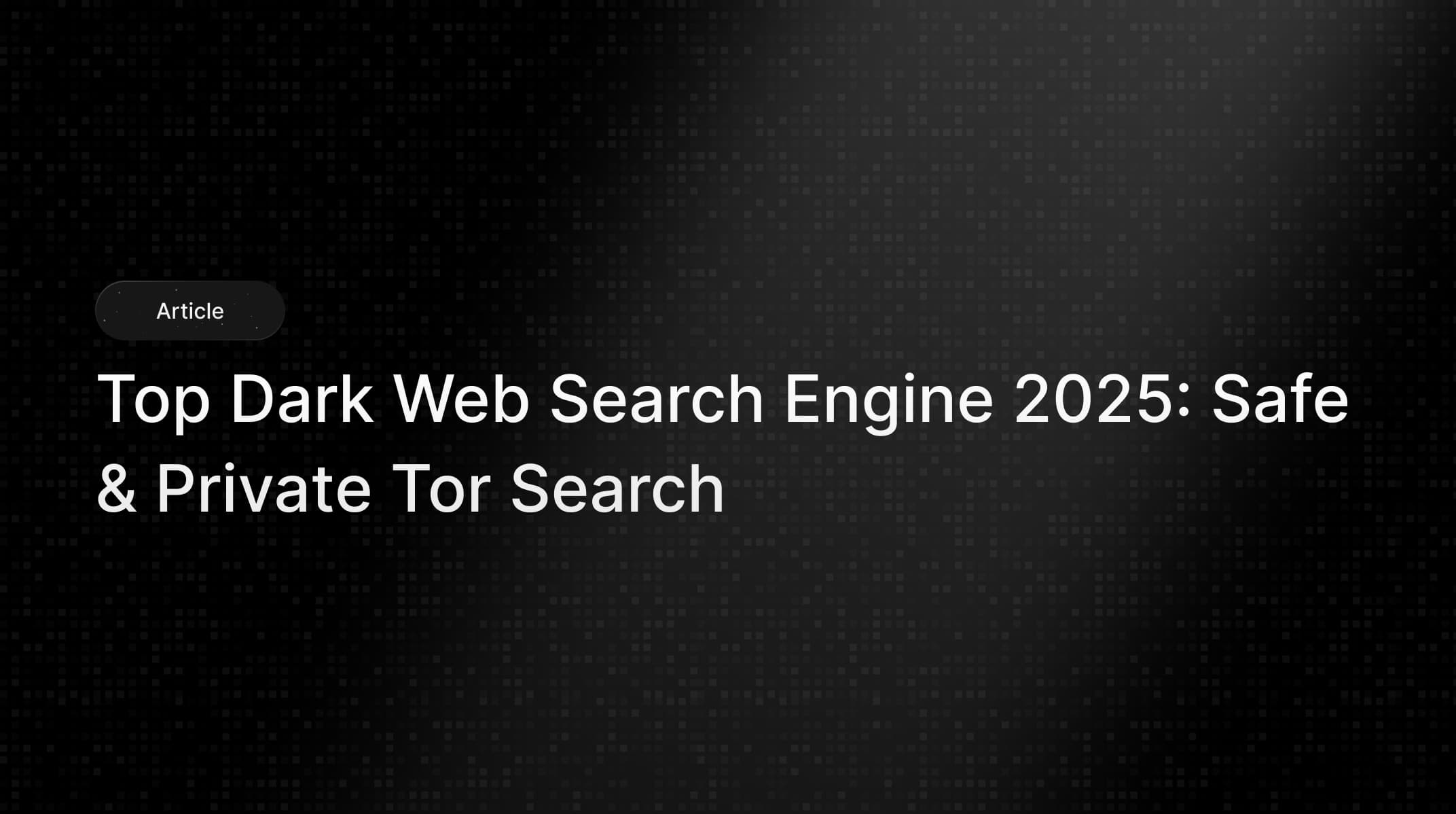
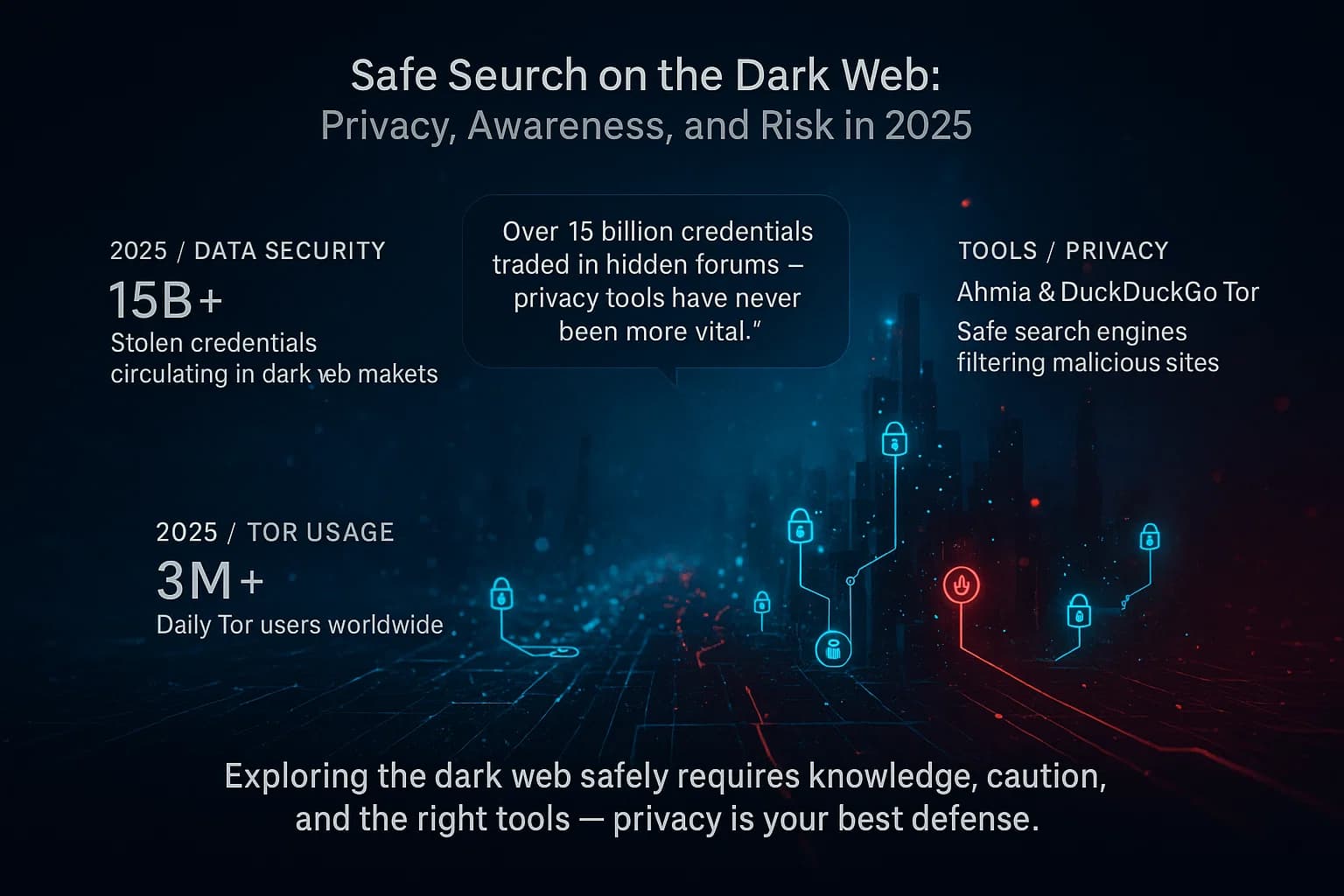
The best way to safely search the dark web is by using specialized dark web search engines that prioritize user safety and privacy. These tools such as Ahmia, DuckDuckGo’s Tor service, and others allow you to find .onion sites through the Tor network while filtering out some of the most dangerous content. In 2025, this matters more than ever. The dark web remains a hotbed of criminal activity, with over 15 billion stolen credentials circulating in underground forums. Daily Tor usage has surged past 3 million people by early 2025, meaning more eyes legit and malicious are on hidden sites than ever.
Why this matters: cybersecurity teams now monitor the dark web to catch leaked data and threats before they hit. For example, finding employee passwords or customer records on a dark web site can tip off a company to a breach. But diving into the dark web blindly is dangerous you could stumble onto malware or illegal content. That’s where safe dark web search engines come in. They help you access threat intelligence on the dark web leaked accounts, hacker chatter, etc. without exposing yourself to unnecessary risk. In short, they’re like the Google of the dark web, but with extra safety guardrails.
This article will explain what dark web search engines are, why they’re needed in 2025, and profile the top dark web search engines that offer safer access to hidden sites. We’ll compare their features in a handy table and give tips on how to use them securely. Whether you’re a security professional doing dark web reconnaissance as part of a penetration test, or just a curious user, these tools can help you explore the dark web with confidence and caution. Let’s get started!
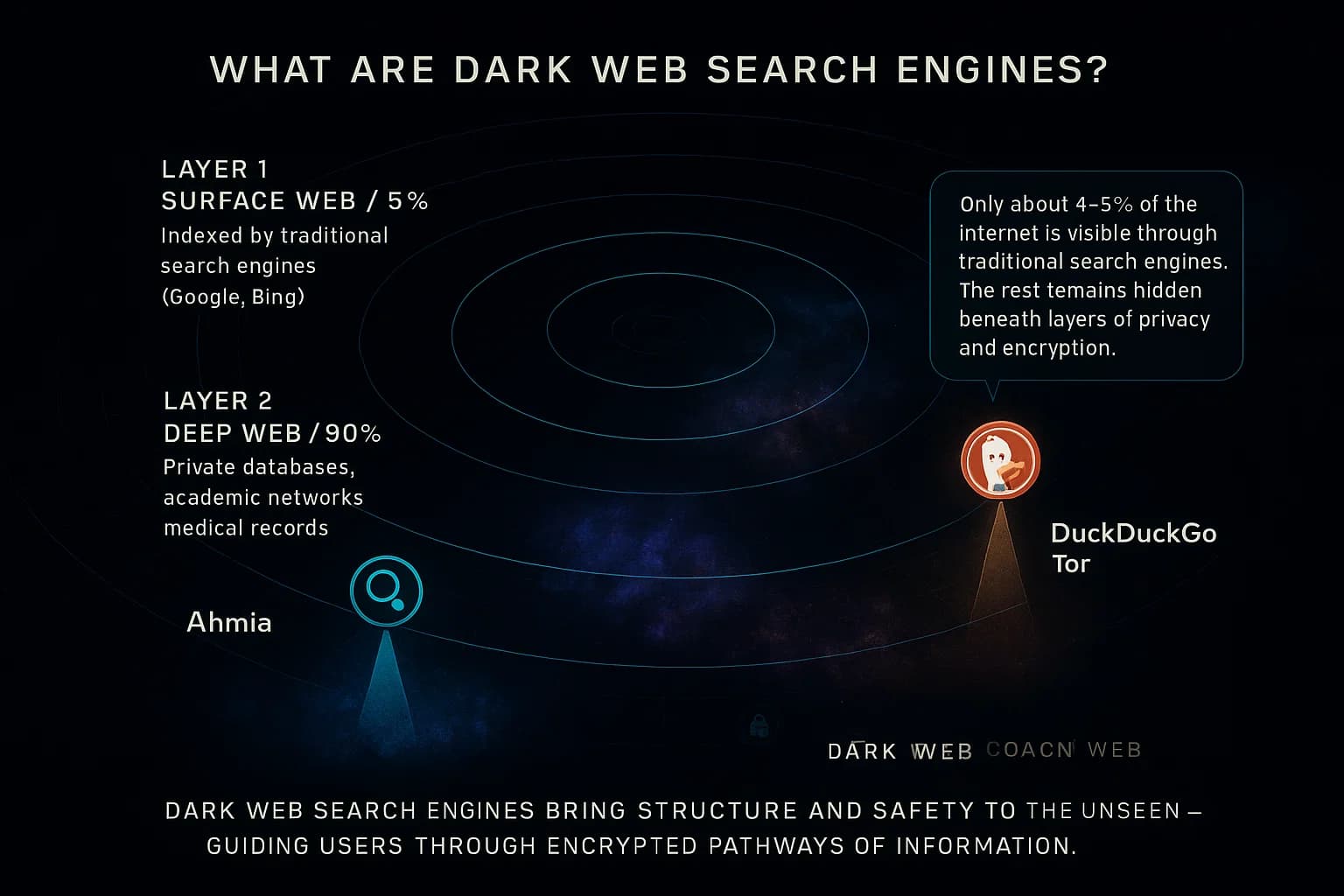
Dark web search engines are specialized search tools for the hidden internet. They index and catalog .onion websites that regular search engines like Google cannot see. By design, dark web sites aren’t indexed by Google they live on the Tor network or similar anonymity networks and require the Tor Browser to access. Think of the dark web as a sealed off library; dark web search engines are like the custom catalog that lets you find books in that secret library.
Unlike Google’s web crawlers that follow links all over the public internet, dark web search engines use Tor based crawlers and sometimes user submissions to discover hidden sites. The process is slower and less comprehensive because many onion sites are transient or not well interlinked. Each dark web search engine has its own approach:
Crucially, dark web search engines vary in safety and filtering. On the surface web, Google will blacklist obviously harmful or illegal sites. On the dark web, some engines attempt to do similar by filtering out known abuse material such as child exploitation, violent illegal content and known scam or malware sites. Others take an index everything approach, showing you the good, bad, and ugly without filters. We’ll highlight which engines are which in the list below.
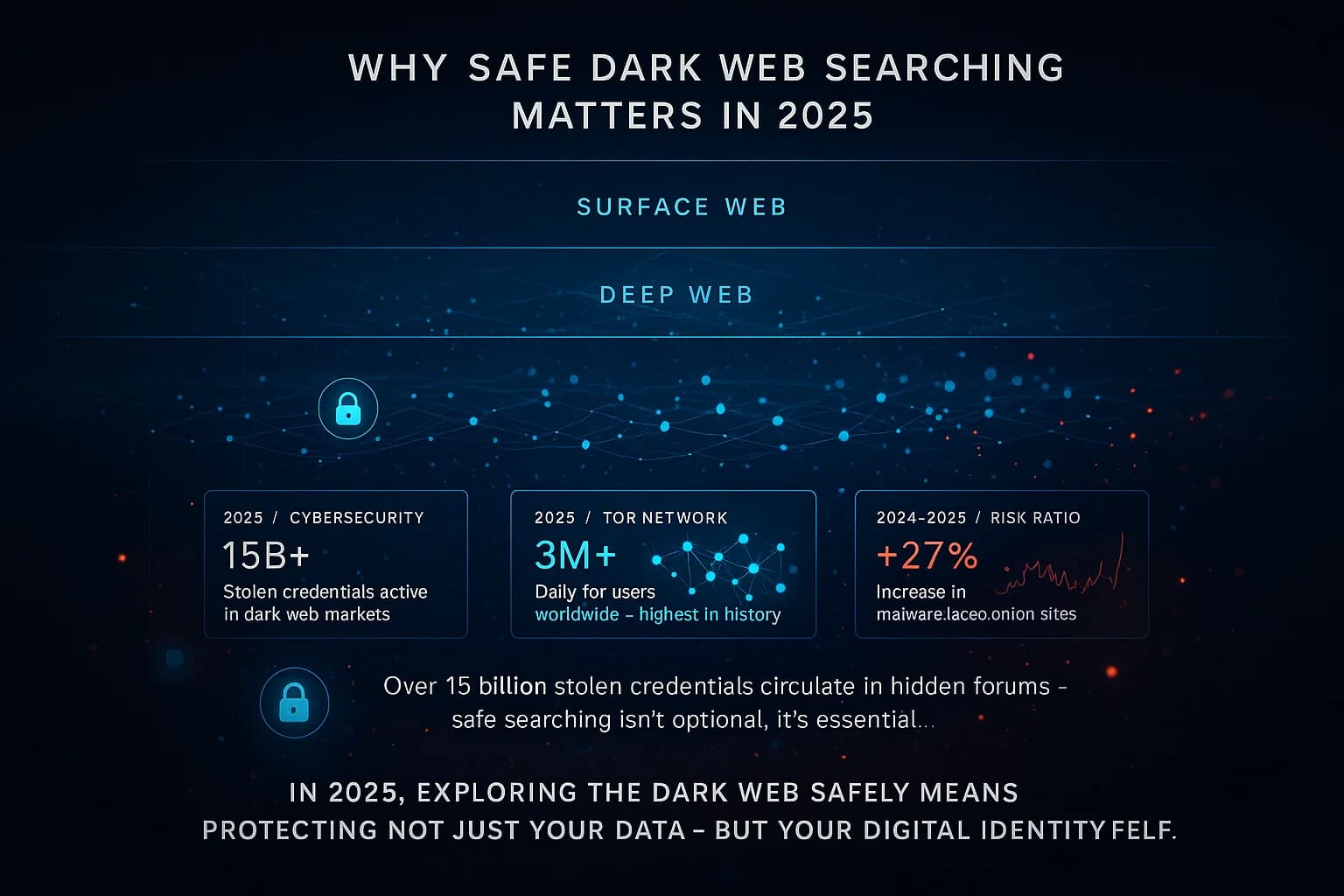
In 2025, the dark web is busier and more dangerous than ever. Data breaches and cybercrime have fed a thriving underground economy. A few trends to note:
For cybersecurity professionals like penetration testers, threat intel analysts, dark web reconnaissance has become a standard part of the job. During a penetration test or security assessment, testers often check dark web sources for leaked passwords, company mentions, or selling of exploits. This information can dramatically improve a pentest for example, if a tester finds a database of your users’ leaked passwords on a dark web site, they can test if those passwords still work to access your network with permission, of course. It’s a way to simulate how a real attacker might leverage dark web intel.
However, accessing these shady corners must be done carefully and legally. Using a safe dark web search engine can save you from accidentally clicking an illegal link. It’s the difference between searching in a well lit hallway versus groping in the dark. You’re less likely to trip on something nasty.
In summary, safe dark web search matters because it lets the good guys peek into the bad guys’ backyard without stepping on a landmine. Now, let’s compare the top search engines that make this possible.
Below we’ve compiled the best dark web search engines that emphasize safer access. Some focus on filtering out harmful content, others on privacy and anonymity, and some on user friendly design. All require the Tor Browser to actually visit the .onion results they find.
To help you choose, here’s a comparison table of key features:
| Search Engine | Content Filtering | Privacy Policy | User Friendliness | Onion Site |
|---|---|---|---|---|
| Ahmia | Yes blocks illegal content | Open source; no user tracking | Beginner friendly; clear web access available | Yes official v3 onion: juhanurmihx...onion |
| DuckDuckGo on Tor | Partial filters adult content; no dark web index | Strict no log policy doesn’t store searches | Very easy default Tor Browser search | Yes duckduckgogg42...onion |
| Torch | No completely uncensored | Minimal Tor anonymity by default; site itself has ads | Simple interface, loads fast | Yes xmh57jrkn...onion |
| Haystak | No default filtering premium users can filter | No tracking; offers ad free premium mode | Clean UI; advanced search options for power users | Yes haystak5njs...onion |
| Not Evil | Yes community flags & blocks abusive sites | No ads, no trackers | Basic text only interface; no ads clutter | Tor access only; not on clearnet |
| DarkSearch | Some community reported content removal | No user logs; free API for anonymous queries | Web interface + API; geared towards security teams | Yes access via darksearch.io or Tor |
| OnionLand | Partial indexes everything V2, V3 onion & I2P, user must filter | No specific tracking; requires JavaScript reduce privacy | Modern UI, search suggestions, multi index search | Yes Tor only; also has clearnet proxy |
| DeepSearch | Yes filters spam and explicit content | Open source; transparent crawling | Moderate focused on precise results over flashy UI | Yes Tor access and clear web portal |
| DarkWebLinks directory | Yes curated: verifies links, blocks scams | Static list; no tracking just a page of links | Very easy navigation by category | Yes v3 onion directory available |
As shown, Ahmia and Not Evil stand out for actively filtering dangerous content, which is great for safer searching. Engines like Torch and Haystak expose everything good for completeness, risky for newcomers. DuckDuckGo isn’t a dark web index per se, but it gives a private searching experience on Tor that many users trust. Now, let’s dive into brief profiles of each tool and what to expect.
Ahmia is one of the most recommended dark web search engines for safe browsing. It filters out illicit content and malware sites from its results, aiming to provide a clean search experience on Tor. In fact, Ahmia has a strict policy against abuse material it actively blocks things like child exploitation content from appearing in searches. This focus on safety has earned it support from the Tor Project itself Ahmia received official backing in 2014.
Why it’s safe: Ahmia’s filtering means you’re less likely to accidentally click something horrific or illegal. It also doesn’t track your queries or IP it’s open source and transparent about privacy. You can even access Ahmia on the regular web clearnet as a starting point searching from there will show onion results that you then open in Tor. For example, an analyst could use Ahmia’s clearnet portal to quickly see if their company’s name appears on any onion sites, without wading through dark web forums manually.
Keep in mind: Because of its filtering, Ahmia’s index is smaller than unfiltered engines like Torch. It may miss some content on purpose, anything flagged as abuse. Also, truly secretive forums won’t show up unless someone submits them, since Ahmia isn’t trawling every corner of the dark web. But for 90% of use cases finding onion sites related to your topic Ahmia is an excellent first stop. Official onion link: juhanurmihxlp77nkq76byazcldy2hlmovfu2epvl5ankdibsot4csyd.onion or just use the clearnet site ahmia.fi.
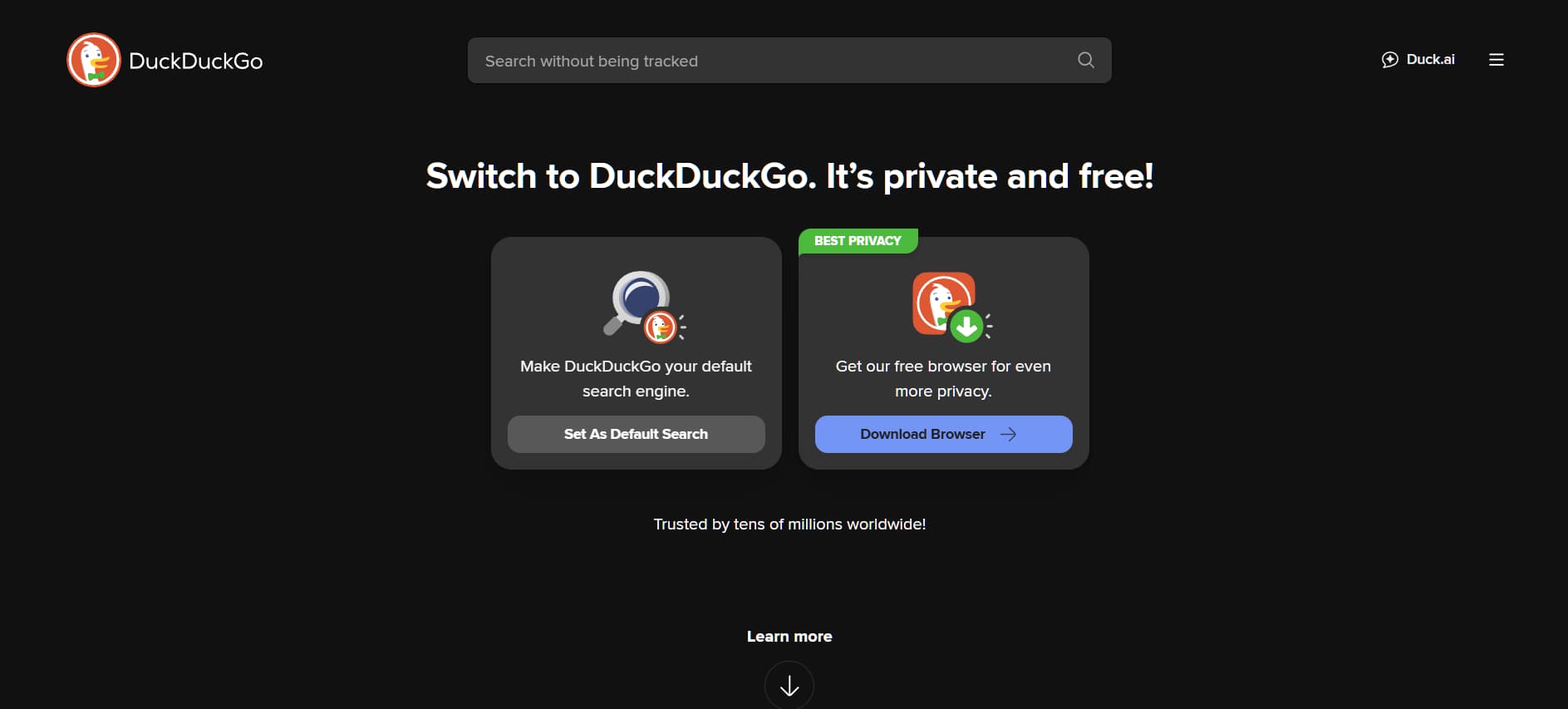
DuckDuckGo is not a dark web specific engine, but it’s hugely popular on Tor for general searching. It’s the default search box in the Tor Browser and known for its no tracking privacy policy. When you access DuckDuckGo via its .onion address, your queries never leave the Tor network, and DuckDuckGo never logs them. This gives you a pretty anonymous way to search the web useful on the dark web where privacy is key.
Important: DuckDuckGo does not index .onion sites beyond maybe a few that have been linked on the clear web. It mostly returns surface web results. So think of it as Google like searching, but over Tor without Google monitoring you. For example, you can search for news or info while on Tor without deanonymizing yourself. DuckDuckGo’s results are safe in the sense that they won’t include outright illegal onion links; they focus on normal web content. It also has a built-in Safe Search filter for adult content.
Why use it: If you’re new to Tor, DuckDuckGo provides a familiar, minimalist interface and peace of mind that your searches aren’t being recorded. It’s great for quick queries from within the dark web environment e.g. checking a definition or navigating to a known site without revealing your identity or triggering Google’s anti Tor captchas.
Limitations: Because it’s not indexing the dark web deeply, DuckDuckGo won’t help you discover many hidden services onion sites. It might show you directories or references to them, but for serious dark web exploration you’ll need other engines on this list. Consider DuckDuckGo your safe starting page when you fire up Tor. The official onion URL is lengthy duckduckgogg42xjoc72x3sjasowoarfbgcmvfimaftt6twagswzczad.onion, but you can find it on the Tor Project’s website or simply use the Tor Browser’s built in search.
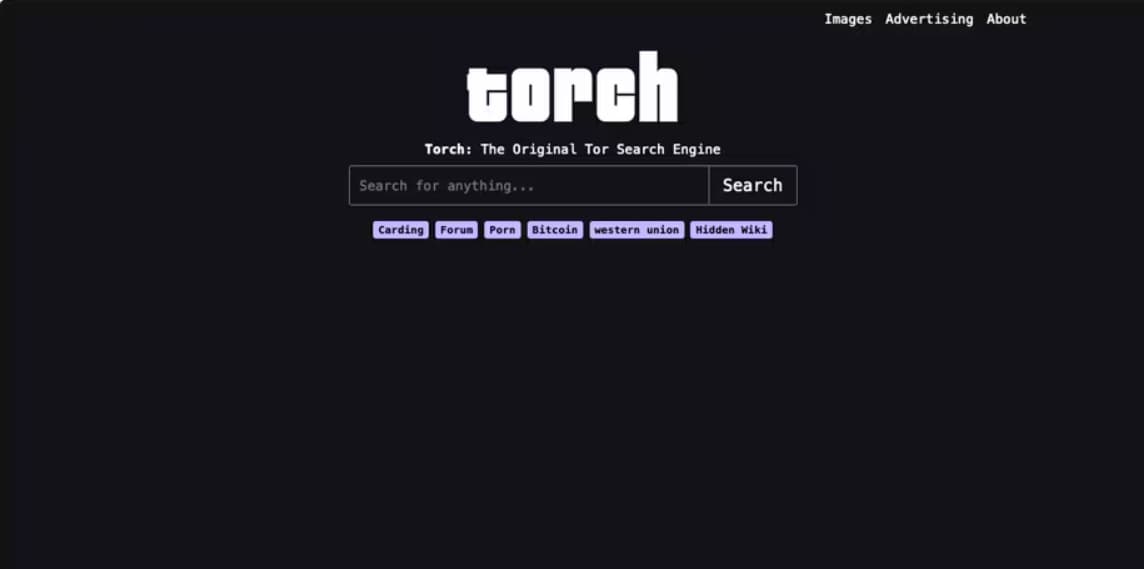
Torch is one of the oldest and largest dark web search engines. Think of Torch as the Google of the dark web in terms of index size it has indexed millions of pages over the years, from marketplaces to forums. If something exists on the dark web, chances are Torch has a link to it. It’s fast and straightforward: just a search box and a long list of results, often with .onion URLs as the title.
Safety trade off: Torch is completely uncensored. It does not filter out illegal or malicious sites. This means anything goes in the results you might see links to disturbing content or obvious scams. Torch’s philosophy is to provide broad access and let the user beware. As a result, using Torch requires a lot of caution. One click on a bad link could expose you to malware or worse. Torch itself is known for having many ads sometimes the top results are actually ads for darknet markets or services. These ads can be misleading never download software or enter info on a site you don’t trust.
So why use Torch? Coverage. If Ahmia comes up empty or you need to cast a wide net, Torch will have more hits. For instance, a security researcher looking for any mentions of Acme Corp on dark web pages might use Torch to ensure no stone is unturned. Just be prepared to sift through a lot of junk and dangerous stuff no training wheels here. Always double check URLs Torch’s results might list multiple versions of a site name, some could be fakes.
Pro tip: Stick to known trustworthy onion addresses when using Torch. If you just search generic terms, be ready for a wild west of results. It’s best for experienced users or when paired with other intel to verify what you find. Official onion link: xmh57jrknzkhv6y3ls3ubitzfqnkrwxhopf5aygthi7d6rplyvk3noyd.onion.
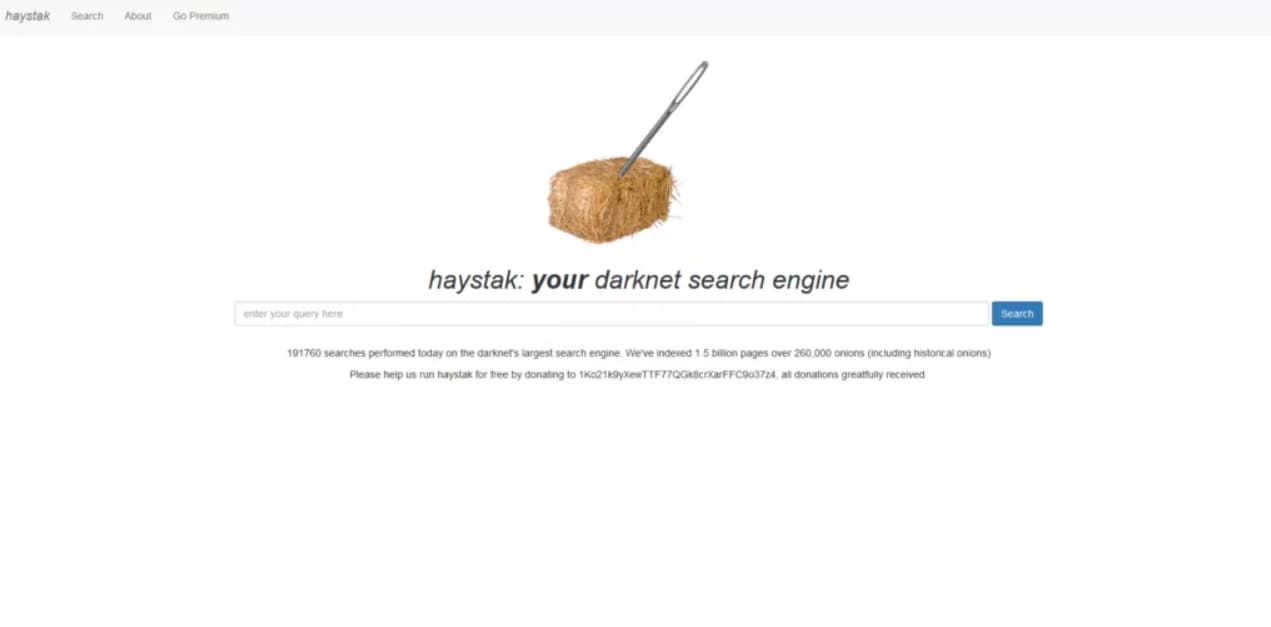
Haystak is like the advanced mode of dark web search. It claims to have indexed over 1.5 billion pages, one of the biggest indexes and runs on a freemium model. The free version lets you search basic keywords and shows results with some ads. The premium version Haystak Pro offers advanced features: you can do complex queries, use filters, and even access historical snapshots of sites. Essentially, Haystak caters to investigators who might need to dig deep or automate searches.
In terms of safety, Haystak does not actively filter out illicit content by default similar to Torch. However, it does flag certain results as potentially risky. Also, because Haystak values privacy, no tracking or personalized ads, like DuckDuckGo, it doesn’t try to push shady content it just lists what matches your search. You should still be careful with what you click.
Unique strengths: If you know what you’re doing, Haystak’s search syntax can save time. For example, you might filter results by date or type, which is handy if you’re monitoring a particular topic. Premium users get an API, which means you could programmatically query Haystak for certain keywords great for continuous dark web monitoring in a security operations center.
For an everyday user, the free Haystak is straightforward: a search box and results, similar to Torch. It might be a bit cleaner in UI, and it won’t track you, but you’ll still see the full gamut of dark web content legal and illegal. Always assume any link could be malicious Haystak doesn’t eliminate that risk.
In short, Haystak is powerful but use with caution. It’s best for those who need advanced search capabilities on the dark web and understand the risks. Onion address: haystak5njsmn2hqkewecpaxetahtwhsbsa64jom2k22z5afxhnpxfid.onion yes, haystak with a ‘k’.
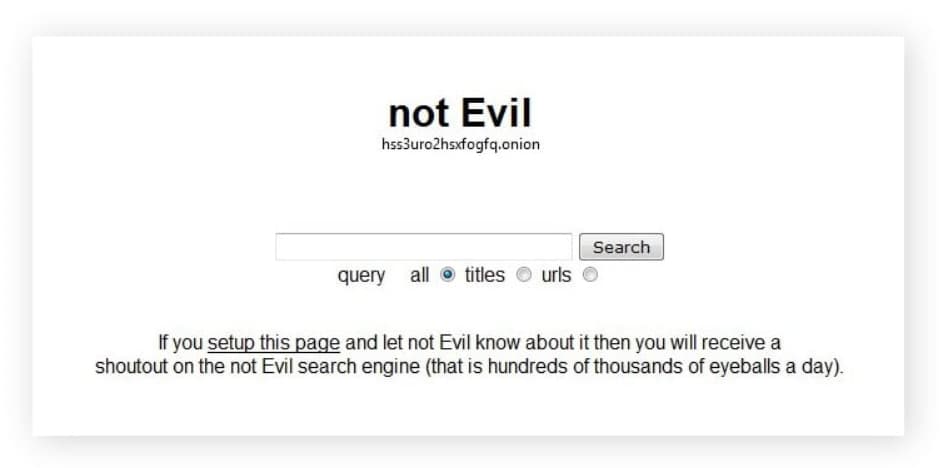
Not Evil, sometimes styled as NotEvil is a dark web search engine with an interesting ethos: it relies on its user community to police the results. The name itself pokes fun at Google’s old motto Don’t be evil. Not Evil tries to live up to that by not engaging in any evil behavior itself no ads, no tracking, no profiling of users. Just a search bar and results pulled from the Tor network.
Where Not Evil shines is its moderation. Users can flag results that are misleading or malicious, and the system will remove or label them accordingly. It also has a hard stance against certain content: for instance, Not Evil actively blocks known child abuse sites and other extreme illegal material. This makes its index cleaner than something like Torch, albeit still use common sense because nothing is foolproof.
Using Not Evil: You’ll find it very minimalistic. It might show only a title and onion link for each result, no fancy snippets or previews. Sometimes it can feel a bit bare bones or slow, likely because it’s run by volunteers and not a big company. Also, Not Evil’s availability can be hit or miss it has been known to go down periodically the dark web is volatile like that. But when it’s up, it’s a favorite among researchers for getting unbiased results without wading through spam.
One thing to note: since Not Evil is Tor only there’s no clear web site, you must use it within Tor Browser. Make sure you have the latest onion URL, as it can change. A quick search on clearnet for Not Evil search engine onion can help you find if it moved.
Not Evil is great for anonymous, crowd sourced safe searching, but always double check important findings across multiple sources. It’s a community effort, which is awesome, but not a 100% guarantee of safety or completeness.
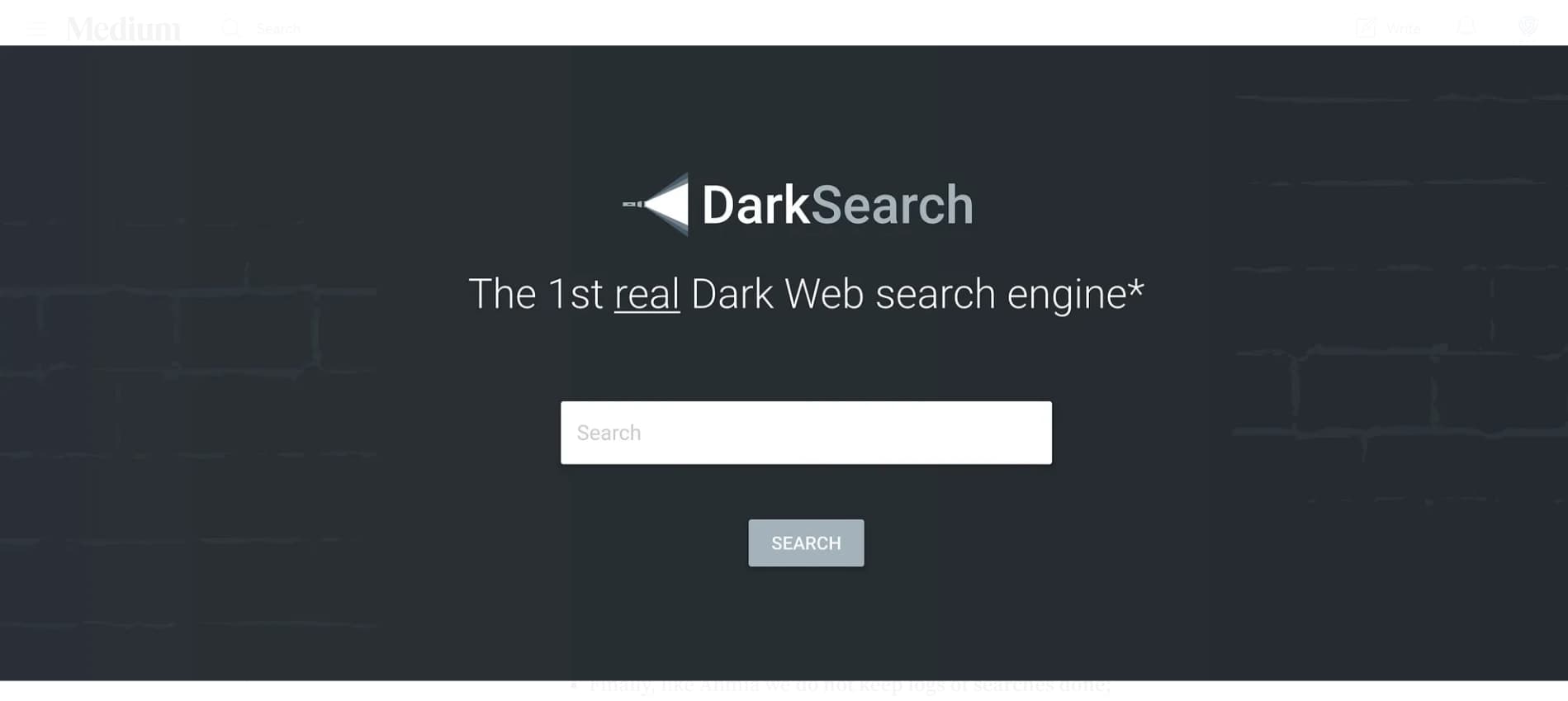
DarkSearch is a newer engine geared towards cybersecurity professionals. It emphasizes automation and integration. In practice, DarkSearch offers a free API that lets you plug dark web search into your own tools or scripts. This is a big deal for companies that want to continuously scan the dark web for their data without manually visiting sketchy sites every day.
Feature wise, DarkSearch does automated crawling of onion sites and combines it with user reporting. So if the community flags something as illegal or malicious, DarkSearch will try to exclude it. Think of it as a hybrid between an unfiltered engine and a moderated one. It aims for broad coverage but with some checks to keep results high quality.
Privacy: As the name suggests, DarkSearch values privacy. They state that they do not store user queries and you can search anonymously. The API similarly doesn’t require personal info you get an API key and can query away.
From an experience standpoint, DarkSearch’s web interface is simple. Results may include some meta info, maybe the first line of the page, etc.. It’s not hugely different from others in look. The real power is if you’re a developer or analyst: you can integrate DarkSearch with SIEM tools or use it to script alerts e.g. alert me if our company name shows up in DarkSearch results.
Use cases: Say you run a continuous penetration testing platform or a threat intel team hooking into DarkSearch’s API could let you know immediately when a new database dump or credential leak mentioning your domain appears on the dark web. That speed is crucial, as one report found a median of 2 days between credentials appearing on the dark web and a ransomware attack using them. Finding that data quickly via search can buy you time to respond.
DarkSearch has a public site darksearch.io and has offered an onion service as well. It might occasionally change, so check their official site for the current onion address. Overall, this is a power user tool great for organizations, possibly overkill for casual browsing.
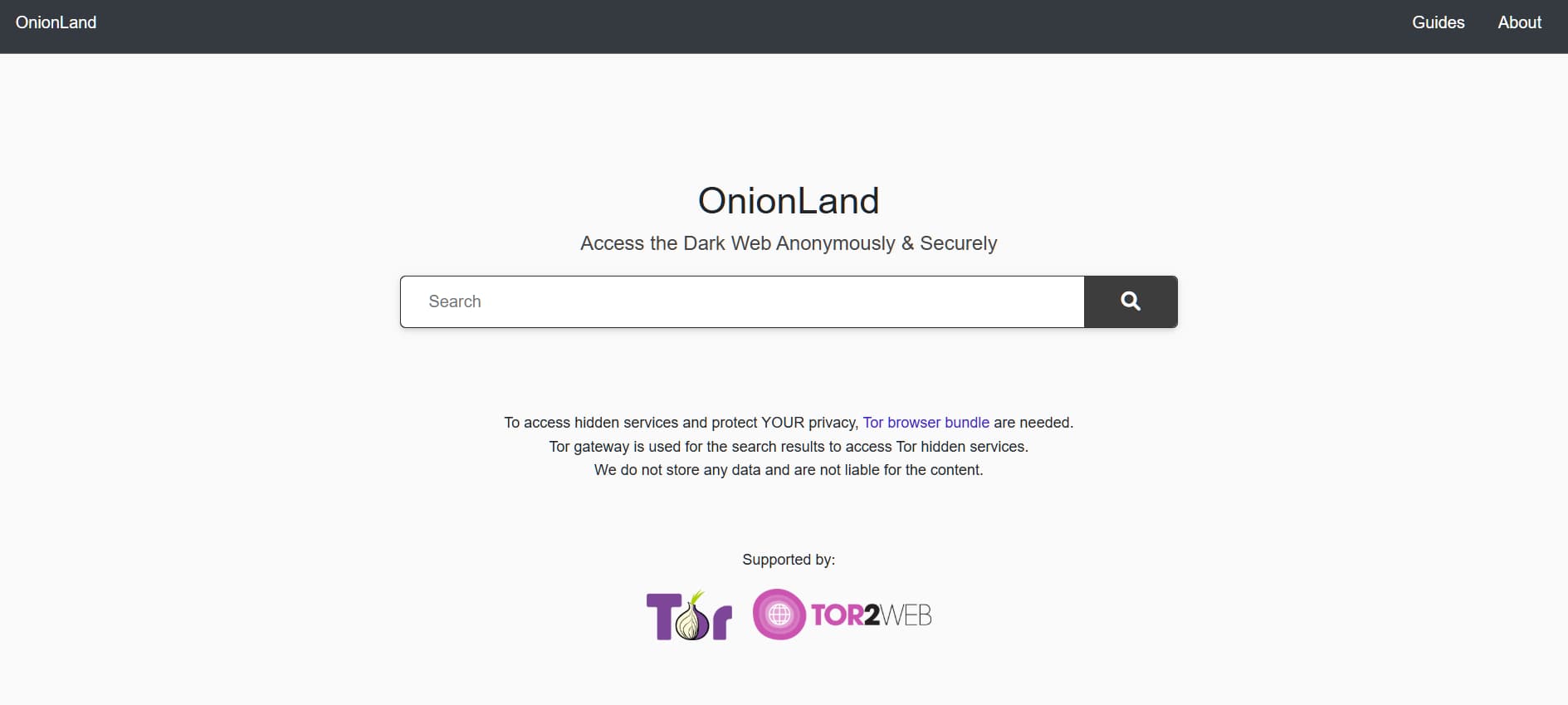
OnionLand is a search engine with a foot in both worlds. It lets you search the dark web and clearnet simultaneously or separately. The interface feels more modern, with features like search suggestions auto complete to help you find what you mean. It also indexes not just Tor .onion sites but I2P sites, another anonymity network and even some regular web content, giving it a unique scope.
For example, you could type a query and get results that include a mix of onion links and normal web links. You can also toggle to only onion results if you want. This can be handy sometimes you might be researching a topic where both dark web and surface web info are relevant, and OnionLand shows both.
Safety and privacy: Here’s the catch OnionLand’s advanced features rely on JavaScript and other web technologies that the Tor Browser usually disables by default. To use OnionLand fully, you might have to lower your Tor Browser security settings allowing scripts, which can expose you to fingerprinting or exploits. So in terms of privacy, OnionLand requires a bit more trust in the platform. It’s known to log some analytics to provide those suggestions, etc. If maximum anonymity is your goal, you might avoid using search engines that need JavaScript.
However, if you do use it, be very cautious: only enable scripts for OnionLand’s own site, and keep your Tor Browser updated. The site claims to not track users beyond what’s needed, but any time you allow scripts on Tor, you open a potential hole. OnionLand does not heavily filter content either it’s more about giving you a broad, user-friendly search.
OnionLand is a convenient tool if you want a Google like experience and don’t mind a slight trade off in privacy for usability. Just remember to turn scripts off again afterwards and never input personal data. This engine is a good example of balancing convenience with caution on the dark web.
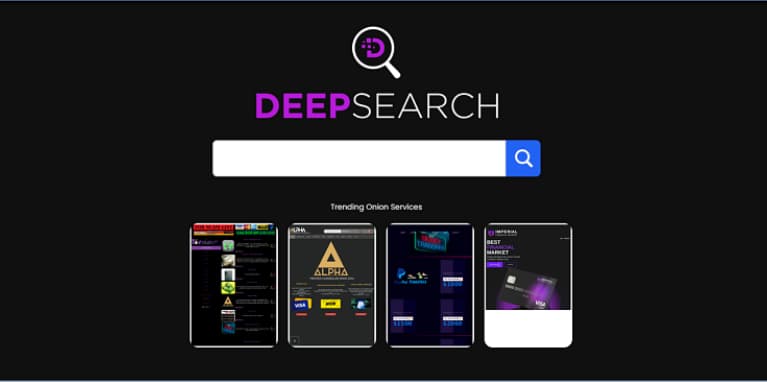
DeepSearch is an open source dark web search engine focused on accuracy over quantity. It’s like the sniper rifle to Torch’s shotgun. Instead of bringing back hundreds of maybe relevant hits including spam, DeepSearch tries to return a smaller set of highly relevant, trustworthy results. It achieves this by filtering out spammy pages, link farms, and obvious junk that plague some dark web searches.
Because it’s open source, anyone can inspect how DeepSearch’s crawler and index work and even contribute. This transparency builds trust you don’t have to worry there’s a shady agenda. Researchers can also run their own instance if they want, tweaking it to their needs.
Using DeepSearch: Expect to find real content with less noise. For instance, if you search a software name, DeepSearch might show you a few relevant forum posts or breach data entries, whereas Torch might show 50 results including random mentions and scam sites. This focus saves time and reduces risk, since you’re not wading through as much dangerous territory.
That said, DeepSearch’s index is smaller. It might miss new sites until it updates, and if it filters too aggressively, you could miss some content e.g. a result might be left out because it looked spammy but had a legit info. For thorough investigations, you’d still cross check with another engine. But for most users, not seeing the spam is a relief.
DeepSearch is great for analysts who know exactly what they’re looking for, say, a specific data leak or keyword and want just the pertinent results. It’s also a learning tool because it’s open source, you can see how dark web crawling works under the hood, which is pretty cool if you’re into cybersecurity research.
You can access DeepSearch on the web they have a clearnet interface or via Tor. The project has been around for a few years and proven itself as a reliable, precise search tool. If you value quality over quantity in search results, give DeepSearch a try for a cleaner dark web search experience.
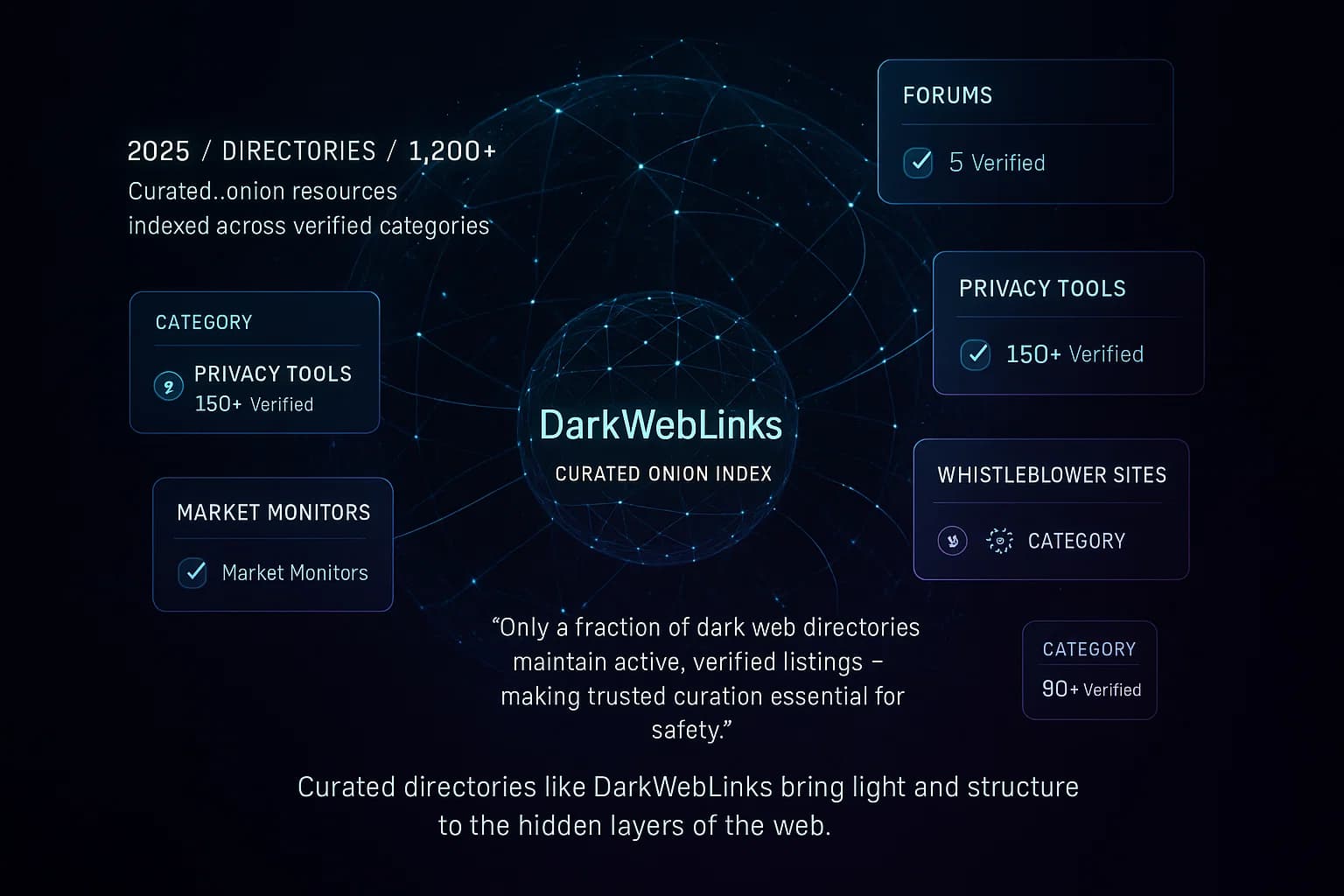
DarkWebLinks is not a traditional search engine but rather a curated directory of popular dark web sites. If you’ve heard of the Hidden Wiki, DarkWebLinks is in the same vein basically a list of onion links organized by category Markets, Forums, Email providers, etc.. The twist is that DarkWebLinks focuses on verified, up to date v3 onion addresses.
One challenge on the dark web is that links often change or go offline. A directory like this stays current with the latest working sites. It also weeds out a lot of scams by only listing sites that have a good reputation or are at least known. For example, you might find categories for Whistleblower sites or Hacking forums with a few trusted names under each.
Safety aspect: While it doesn’t search the whole dark web, a directory is inherently safer to navigate for newcomers because you’re not getting random results you’re choosing from a pre-selected list. DarkWebLinks explicitly avoids listing things like child porn and tries to flag scam sites some directories even maintain a scam list of sites to avoid. This doesn’t mean everything on it is legal or safe, many are still illicit marketplaces, etc., but at least you know what you’re clicking to some extent.
Using a directory is a good first step if you’re looking to explore the dark web cautiously. Instead of typing queries and possibly stumbling on nasty stuff, you can go category by category. For instance, journalists might use DarkWebLinks to find established forums where hackers hang out, as opposed to discovering a fake forum via search that’s actually a phishing trap.
Even directories can become outdated or compromised, so ensure you have the genuine DarkWebLinks site check multiple sources for the onion URL. And just because a site is listed doesn’t make it safe you still need to practice OPSEC, don't log in with real emails, etc..
Overall, DarkWebLinks and similar directories are like guidebooks for the dark web. They won’t cover everything, but they give you a reliable starting point. It’s often recommended to use such directories in combination with search engines like those above get the lay of the land from the directory, then use a search engine for deeper digging in specific areas.
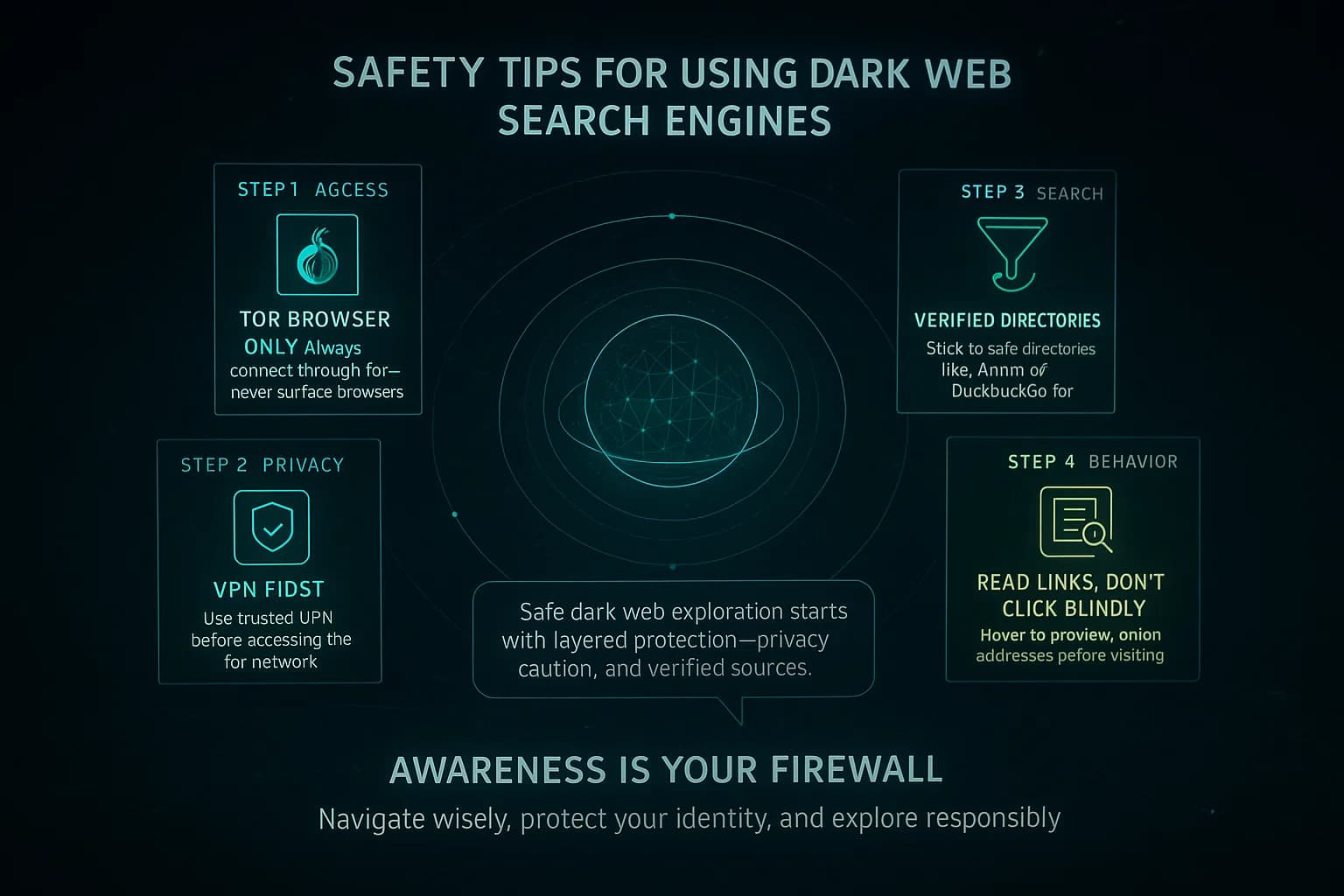
Even with safe search tools, the dark web can be perilous. Follow these best practices to protect yourself:
By following these precautions, you dramatically reduce the risks of exploring the dark web. In short: keep your guard up, use the right tools, and know when to step back. The dark web is not governed by the safety rules of the normal internet you are your own guard.
Safety recap: Use Tor, avoid unfamiliar sites/downloads, and maintain strict operational security. It’s like wandering a sketchy neighborhood at night, sticking to lit paths and don’t flash personal details.
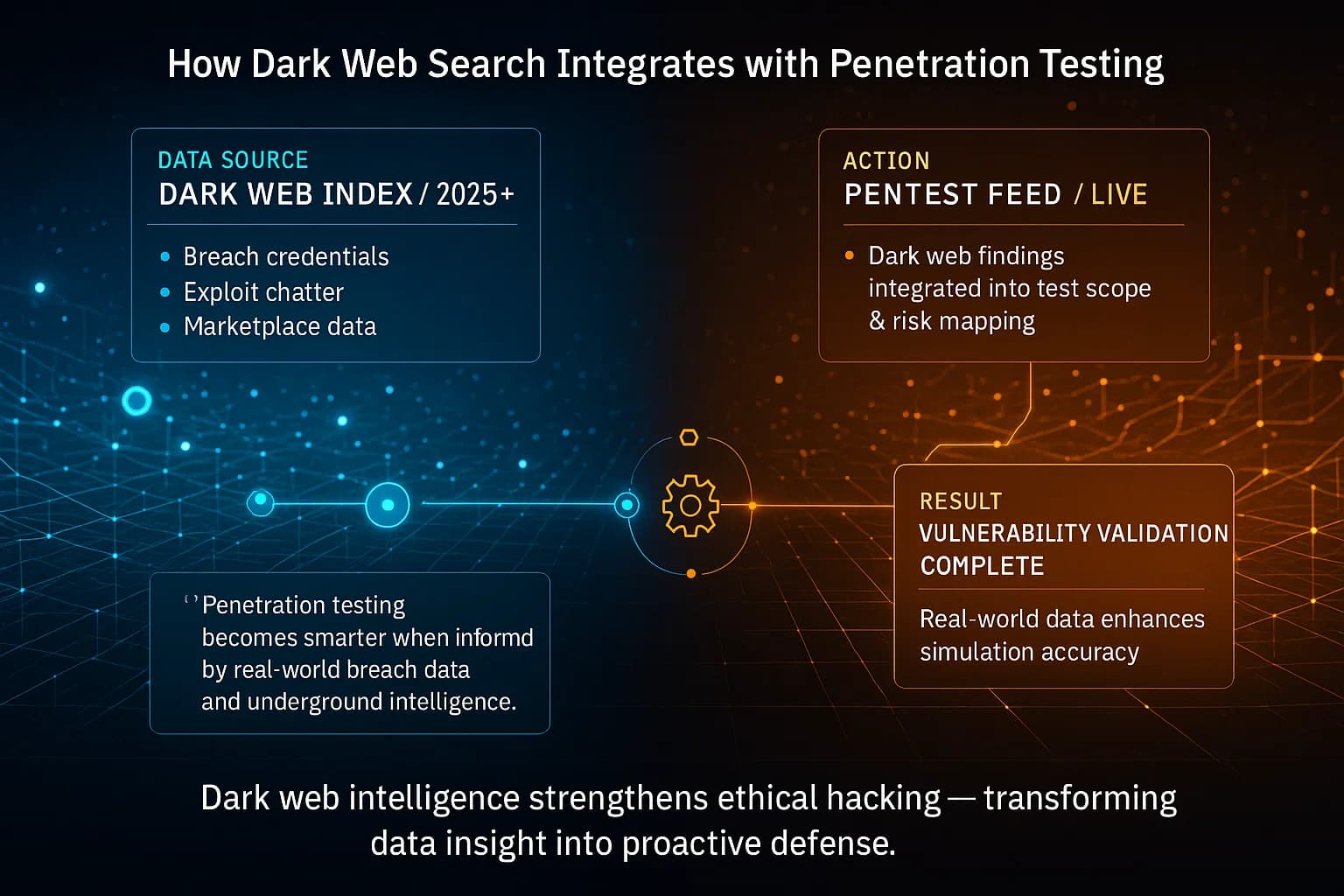
You might be wondering, why is a penetration testing firm like DeepStrike talking about dark web search engines? The answer is reconnaissance. In ethical hacking engagements pentests, one step is often to gather OSINT Open Source Intelligence about the target organization. This can include checking the dark web for any leaked passwords, confidential data, or chatter that could be used in an attack. Think of it as seeing your company from an attacker’s perspective if your admin’s password leaked on a forum, a hacker would find it and try it; so we want to find it first.
Dark web search engines make this process more efficient. Rather than manually combing through forums, a pentester can use tools like Ahmia or DarkSearch to quickly spot mentions of the client’s domain or sensitive projects. For example, a consultant might discover API keys or network diagrams being shared on a dark web paste site, which would be an immediate red flag to report. We even have cases where password dumps for sale on dark markets include an organization’s users using dark web search, testers can sometimes procure those legally, with permission to strengthen a password audit.
Another area is account takeover simulation. If employees reuse passwords, their old breached credentials widely available on the dark web could let an attacker in. Pentesters search for those leaked creds there are specialized search engines and datasets for this. In fact, some dark web search engines double as breach data lookup tools where you can query an email and see if it appears in dumps extremely useful for demonstrating risk to a client.
From a defense standpoint, many companies now invest in dark web monitoring services. These often are powered by the same principles as the search engines we discussed: crawling sites, indexing new dumps, alerting when something relevant pops up. Providers like Recorded Future, KELA, or Threat Intelligence platforms integrate dark web search capabilities to feed into organizations’ security dashboards. They’ll flag, say, We found your VPN credentials on a dark web pastebin. That early warning can prevent a breach.
In penetration tests, we often include a dark web exposure analysis in the report essentially, Here’s what a hacker could learn about you from the dark web in 30 minutes. It’s often eye opening for clients. Using these search engines responsibly allows us to gather that intelligence quickly and safely, without stumbling into illegal territory.
To sum up, dark web search engines are a valuable extension of the professional hacker toolkit. They connect the dots between the underground and your organization. For companies, regularly checking these sources or having a service do it is now part of good hygiene, right alongside patching and regular pentesting. If you’re not looking, rest assured the bad guys are.
The dark web doesn’t have to be a no go zone. With the right search engines and precautions, you can safely explore what’s lurking in the hidden corners of the internet whether you’re hunting threat intelligence, checking for your own data leaks, or just satisfying curiosity. We’ve covered how tools like Ahmia and DuckDuckGo’s onion service keep things clean and private, while veterans like Torch and Haystak offer deep access with caution. Ultimately, knowledge is power: knowing which search engines to trust and how to navigate responsibly makes all the difference.
Ready to Strengthen Your Defenses? The threats of 2025 demand more than just awareness; they require readiness. If you’re looking to validate your security posture, identify hidden risks, or build a resilient defense strategy, DeepStrike is here to help. Our team of practitioners provides clear, actionable guidance to protect your business.
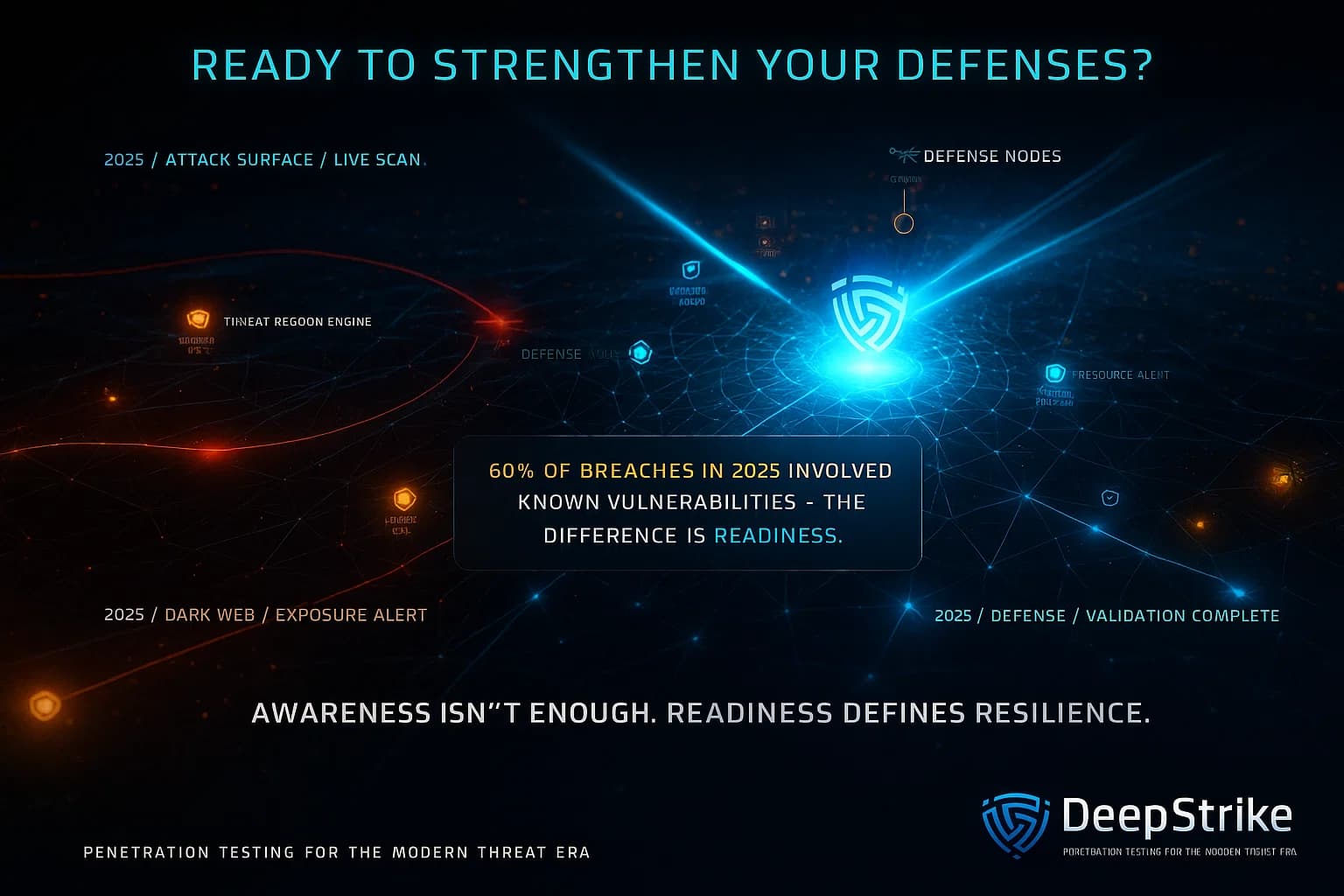
Explore our penetration testing services to see how we can uncover vulnerabilities before attackers do. We routinely include dark web reconnaissance in our assessments if there’s exposed data out there, we’ll find it and help you plug the leaks. Drop us a line, we’re always ready to dive in.
About the AuthorMohammed Khalil is a Cybersecurity Architect at DeepStrike, specializing in advanced penetration testing and offensive security operations. With certifications including CISSP, OSCP, and OSWE, he has led numerous red team engagements for Fortune 500 companies, focusing on cloud security, application vulnerabilities, and adversary emulation. His work involves dissecting complex attack chains and developing resilient defense strategies for clients in the finance, healthcare, and technology sectors.
There isn’t a single best for everyone, it depends on your needs. Ahmia is often recommended as the best safe dark web search engine because it filters out illegal content and has Tor Project support. If you want the largest index and don’t mind unfiltered results, Torch is a top choice it’s one of the oldest and has tons of pages, but be cautious. DuckDuckGo’s onion service is best for general use and privacy though it’s not dark web specific. In a nutshell: Ahmia for safety, Torch for breadth, DuckDuckGo for privacy. Many researchers actually use multiple search engines to cover all bases.
No Google cannot index or take you to dark web sites. Dark web pages use special .onion addresses and require the Tor Browser to access, which Google’s bots don’t crawl. If you try to Google a known onion site, you usually won’t find it. Google only shows surface web results. To reach the dark web, you must use Tor and then a dark web search engine or directory to find addresses. In short, Google stays on the clear web; it won’t directly help you navigate the dark web.
In most places, accessing the dark web is not illegal by itself. Using Tor and searching for information is perfectly legal. It’s what you do there that could be illegal. For example, just searching for data breaches or browsing forums isn’t a crime, but if you were to buy something illegal drugs, hacked data or view/distribute illicit content, that’s definitely illegal. Dark web search engines themselves are just tools. So as long as you’re not engaging in criminal acts on the dark web, you’re on the right side of the law. Always stay within legal boundaries and use common sense.
DuckDuckGo is a privacy focused search engine that you can use on the dark web via its Tor hidden service onion address. However, it mainly searches the normal web*, not hidden .onion sites. It’s the default search in Tor Browser because it doesn’t track you, which makes it a good fit for anonymous browsing. So, while DuckDuckGo isn’t indexing dark web content, it is often used within the dark web as a convenient, safe search tool. Think of it as your general search engine while using Tor, whereas something like Ahmia or Torch is a true dark web onion search engine.
It’s optional. You do not need a VPN to use the dark web Tor Browser alone is designed to protect your anonymity by bouncing your traffic. Using a VPN in addition connecting to VPN, then Tor can conceal from your ISP that you’re using Tor and add an extra layer of IP masking. Some people like this for peace of mind, or if Tor is blocked by their network. However, a VPN introduces its own trust factor you’re trusting the VPN not to log you, and it can slow down your connection further. The Tor Project doesn’t require it. If you do use one, pick a reputable no log VPN service. But for most users, running Tor Browser by itself is sufficient and actually simpler, fewer things to go wrong.
It depends on the engine and your browsing behavior. Engines like Ahmia, Not Evil, and those with filtering are safer in that they deliberately exclude some dangerous content, reducing the chance you’ll accidentally land somewhere bad. They also don’t track your queries, which is good. However, no search engine can make the dark web 100% safe there’s always a risk in clicking unknown links. Unfiltered engines Torch, Haystak, etc. will display everything, including scam sites or malware laced pages these are only as safe as your own caution. The search engine itself might be safe, but the links it gives you might not be. Always use an updated Tor Browser, follow the safety tips, no personal info, no downloads, high security settings, and you can use dark web search engines with minimal risk. They are a tool in the end, your safe experience comes down to how you use that tool.

Stay secure with DeepStrike penetration testing services. Reach out for a quote or customized technical proposal today
Contact Us